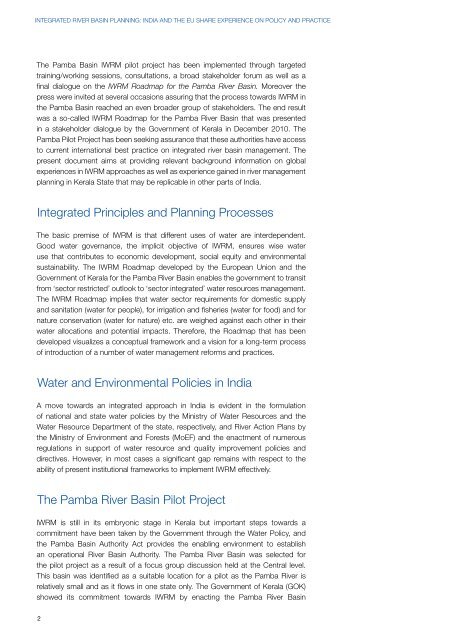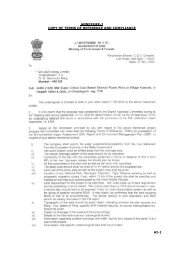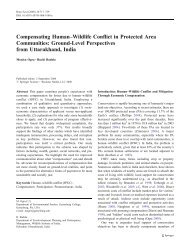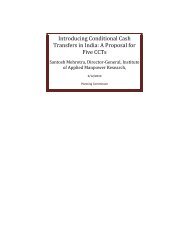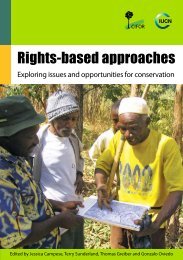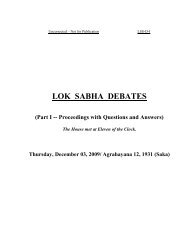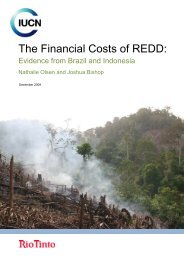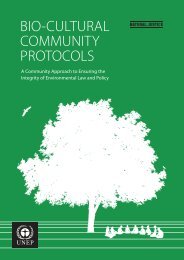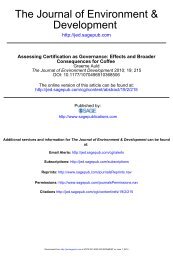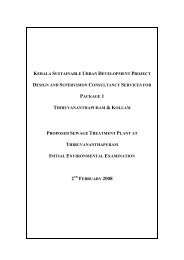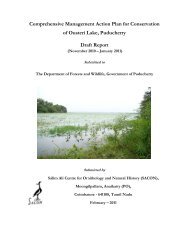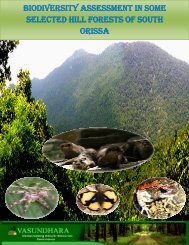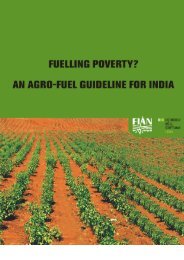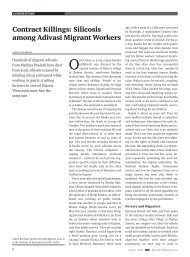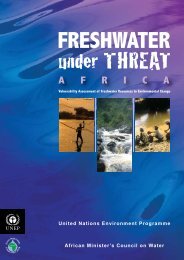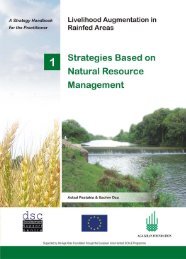Integrated River Basin Planning – Replicable ... - India Water Portal
Integrated River Basin Planning – Replicable ... - India Water Portal
Integrated River Basin Planning – Replicable ... - India Water Portal
Create successful ePaper yourself
Turn your PDF publications into a flip-book with our unique Google optimized e-Paper software.
<strong>Integrated</strong> <strong>River</strong> <strong>Basin</strong> <strong>Planning</strong>: <strong>India</strong> and the EU share experience on policy and practice<br />
SUMMARY<br />
The Pamba <strong>Basin</strong> IWRM pilot project has been implemented through targeted<br />
training/working sessions, consultations, a broad stakeholder forum as well as a<br />
final dialogue on the IWRM Roadmap for the Pamba <strong>River</strong> <strong>Basin</strong>. Moreover the<br />
press were invited at several occasions assuring that the process towards IWRM in<br />
the Pamba <strong>Basin</strong> reached an even broader group of stakeholders. The end result<br />
was a so-called IWRM Roadmap for the Pamba <strong>River</strong> <strong>Basin</strong> that was presented<br />
in a stakeholder dialogue by the Government of Kerala in December 2010. The<br />
Pamba Pilot Project has been seeking assurance that these authorities have access<br />
to current international best practice on integrated river basin management. The<br />
present document aims at providing relevant background information on global<br />
experiences in IWRM approaches as well as experience gained in river management<br />
planning in Kerala State that may be replicable in other parts of <strong>India</strong>.<br />
<strong>Integrated</strong> Principles and <strong>Planning</strong> Processes<br />
The basic premise of IWRM is that different uses of water are interdependent.<br />
Good water governance, the implicit objective of IWRM, ensures wise water<br />
use that contributes to economic development, social equity and environmental<br />
sustainability. The IWRM Roadmap developed by the European Union and the<br />
Government of Kerala for the Pamba <strong>River</strong> <strong>Basin</strong> enables the government to transit<br />
from ‘sector restricted’ outlook to ‘sector integrated’ water resources management.<br />
The IWRM Roadmap implies that water sector requirements for domestic supply<br />
and sanitation (water for people), for irrigation and fisheries (water for food) and for<br />
nature conservation (water for nature) etc. are weighed against each other in their<br />
water allocations and potential impacts. Therefore, the Roadmap that has been<br />
developed visualizes a conceptual framework and a vision for a long-term process<br />
of introduction of a number of water management reforms and practices.<br />
<strong>Water</strong> and Environmental Policies in <strong>India</strong><br />
A move towards an integrated approach in <strong>India</strong> is evident in the formulation<br />
of national and state water policies by the Ministry of <strong>Water</strong> Resources and the<br />
<strong>Water</strong> Resource Department of the state, respectively, and <strong>River</strong> Action Plans by<br />
the Ministry of Environment and Forests (MoEF) and the enactment of numerous<br />
regulations in support of water resource and quality improvement policies and<br />
directives. However, in most cases a significant gap remains with respect to the<br />
ability of present institutional frameworks to implement IWRM effectively.<br />
The Pamba <strong>River</strong> <strong>Basin</strong> Pilot Project<br />
IWRM is still in its embryonic stage in Kerala but important steps towards a<br />
commitment have been taken by the Government through the <strong>Water</strong> Policy, and<br />
the Pamba <strong>Basin</strong> Authority Act provides the enabling environment to establish<br />
an operational <strong>River</strong> <strong>Basin</strong> Authority. The Pamba <strong>River</strong> <strong>Basin</strong> was selected for<br />
the pilot project as a result of a focus group discussion held at the Central level.<br />
This basin was identified as a suitable location for a pilot as the Pamba <strong>River</strong> is<br />
relatively small and as it flows in one state only. The Government of Kerala (GOK)<br />
showed its commitment towards IWRM by enacting the Pamba <strong>River</strong> <strong>Basin</strong><br />
Authority in 2009. This Pilot Project has developed a Roadmap for the development<br />
of an IWRM Roadmap for the Pamba <strong>River</strong> and, at the same time, to support<br />
the newly set up Pamba <strong>River</strong> <strong>Basin</strong>g Authority in devising a management plan<br />
for future priority actions. The Roadmap has been developed in collaboration with<br />
stakeholders from various sectors of the Government of Kerala, the Centre for<br />
<strong>Water</strong> Resources Development and Management and civil society represented by<br />
non-governmental organisations (NGOs) active in the <strong>Basin</strong>. A ‘Roadmap’ is the<br />
transition to a sustainable water resources management practice which is crosssectoral,<br />
decentralized, and considers the entire catchment of a river basin as a<br />
single management unit. The current project has provided first of all, a framework<br />
for exploring the following questions:<br />
1. Where is the state (Kerala) in the IWRM planning process in the Pamba <strong>River</strong><br />
<strong>Basin</strong>?<br />
2. What are the constraints in the state to the planning process?<br />
3. Which actions should be taken to prepare the IWRM plan for the Pamba<br />
<strong>River</strong> <strong>Basin</strong>?<br />
4. What will the actions require?<br />
The Pamba Pilot Project analyzed water resources management practices currently<br />
being applied in the state according to the three IWRM pillars: (1) the existence<br />
of appropriate policies, strategies and legislation for sustainable water resources<br />
development and management; (2) putting in place the institutional framework<br />
through which to implement the policies, strategies and legislation; and (3) setting<br />
up the management instruments required by these institutions to do their job.<br />
A first attempt to integrate public participation in the creation of an Action Plan<br />
for the Pamba <strong>River</strong> was carried out by the Kerala State Pollution Control Board<br />
in 2002. A comprehensive Action Plan was developed for pollution abatement for<br />
the <strong>River</strong> Pamba. The document is an attempt towards solving water pollution<br />
issues in the <strong>River</strong> <strong>Basin</strong> but, according to IWRM principles, this is a piecemeal<br />
approach. In order to come to an integrated management plan for the Pamba <strong>River</strong>,<br />
various factors need to be considered. Those issues in need of attention have been<br />
explored in this document.<br />
IWRM in Kerala is more advanced than in other states in <strong>India</strong>. Kerala already has<br />
a vision which is encapsulated in the <strong>Water</strong> Policy of 2008 and in the enactment<br />
of the Pamba <strong>River</strong> <strong>Basin</strong> Authority which is represented by stakeholders from 11<br />
different governmental sectors as well as autonomous research institutes. However,<br />
water management is still sectoral and inclined towards service delivery with a bias<br />
towards the strong irrigation sector. Stakeholder participation is starting to exist<br />
with the recent resurrection of the Pamba <strong>River</strong> <strong>Basin</strong> Authority that has been called<br />
back into existence in the past year.<br />
<strong>Water</strong> related issues identified were accounted to the increase of pilgrims travelling<br />
to the area during the Sabarimala annual pilgrimage, to which an estimated 45<strong>–</strong><br />
50 million devotees come every year, lack of awareness, continuous increase of<br />
contamination due to urban waste, sand mining, encroachment and sedimentation.<br />
On the other hand, management problems were identified to ranging from<br />
legislations and policies not being enacted, lack of enforcement of existing legal<br />
framework, adjustment of existing legal water framework for Kerala state, setting-up<br />
2 3


